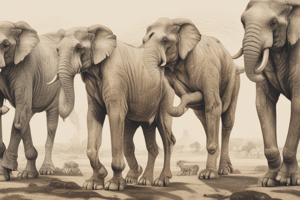Podcast
Questions and Answers
What fundamental change allowed humans to produce sounds for language?
What fundamental change allowed humans to produce sounds for language?
- Genetic mutation in the brain
- Ability to invent words (correct)
- Increased brain size
- Development of complex social structures
What is suggested to have occurred between 100,000 and 50,000 years ago?
What is suggested to have occurred between 100,000 and 50,000 years ago?
- Language became primitive and less complex
- Humans lost the ability to create sounds
- Evidence of early human civilization appeared (correct)
- The human brain increased significantly in size
Which aspect of language may have developed without further brain evolution?
Which aspect of language may have developed without further brain evolution?
- Invention of new vocabulary
- Basic sentence structures
- Ability to use plurals
- Complex grammar (correct)
What gene mutation is believed to be linked to language ability in humans?
What gene mutation is believed to be linked to language ability in humans?
Which question regarding the evolution of language remains unanswered?
Which question regarding the evolution of language remains unanswered?
Which primate shares a similar gene but did not experience the significant mutation related to language?
Which primate shares a similar gene but did not experience the significant mutation related to language?
What is hypothesized about the relationship between language and brain complexity?
What is hypothesized about the relationship between language and brain complexity?
In what way do researchers believe genetics may play a role in language development?
In what way do researchers believe genetics may play a role in language development?
What is one primary focus of linguistics mentioned in the content?
What is one primary focus of linguistics mentioned in the content?
Which group of languages is traced back to tribes in eastern Europe around 3000 BC?
Which group of languages is traced back to tribes in eastern Europe around 3000 BC?
What aspect of human language distinguishes it from that of chimpanzees?
What aspect of human language distinguishes it from that of chimpanzees?
What does the development of the mouth, throat, and tongue in early humans suggest?
What does the development of the mouth, throat, and tongue in early humans suggest?
What potential capability do dolphins share with humans regarding language?
What potential capability do dolphins share with humans regarding language?
Which field is being explored for insights into the human ability for language?
Which field is being explored for insights into the human ability for language?
What limitation do researchers face when studying the speech capabilities of early humans?
What limitation do researchers face when studying the speech capabilities of early humans?
What is implied about the complexity of human language compared to animal communication?
What is implied about the complexity of human language compared to animal communication?
Flashcards are hidden until you start studying
Study Notes
Linguistics and Language Development
- Over 5,000 languages exist today, studied through linguistics to understand grammar and pronunciation.
- The Indo-European language family includes Norwegian, Hindi, and English, tracing back to eastern European tribes around 3000 BC.
- While much has been mapped in language history, many areas remain unexplored.
Evolutionary Biology and Language
- Experts are investigating human evolution to understand language capabilities, with more questions than definitive answers.
- Human language is more complex than that of primates like chimpanzees, allowing expression of complex thoughts and emotions.
Innate Language Rules
- Grammar serves as a structural rule for language, traditionally believed to be unique to humans.
- Research suggests dolphins may also utilize a system of rules, recognizing when those rules are breached.
Brain Differences and Language Evolution
- The evolution of human brains differs from other animals, impacting language capabilities.
- Physical evidence from early humans shows mouth and throat development, enabling complex sound production about 100,000 years ago.
Protolanguage and Sentence Formation
- Early humans likely communicated using basic sounds; the transition to complex language is unclear.
- The development of words and their arrangement into sentences reflects a protolanguage used during early childhood language acquisition.
Grammar and Advanced Language Structures
- The evolution of grammar to signify complex ideas like time and plurality may relate to increased societal complexity.
- Evidence of early human civilization appears between 100,000 and 50,000 years ago, visualized through cave paintings, though connections to language are unknown.
Brain Complexity and Language
- Human brain size did not drastically increase; however, cognitive complexity and intelligence improved.
- It's debated whether language influenced brain development or if advanced brains led to language emergence.
Genetic Influence on Language
- Investigations into genetics aim to identify mutations related to language abilities.
- A specific gene mutation linked to speech found between 200,000 and 100,000 years ago differs in humans from that in monkeys, which did not undergo such changes.
- The influence of genetics on language development remains an open question, with potential insights residing in our DNA.
Studying That Suits You
Use AI to generate personalized quizzes and flashcards to suit your learning preferences.




